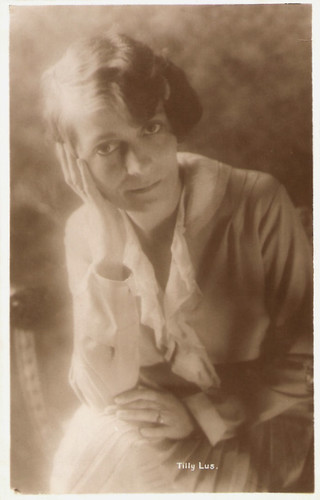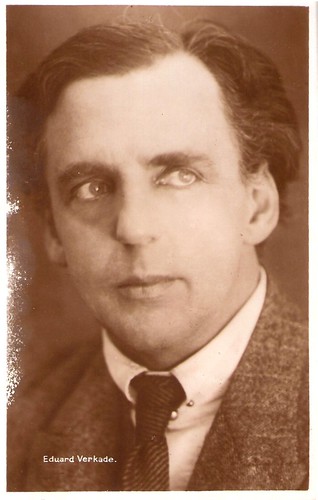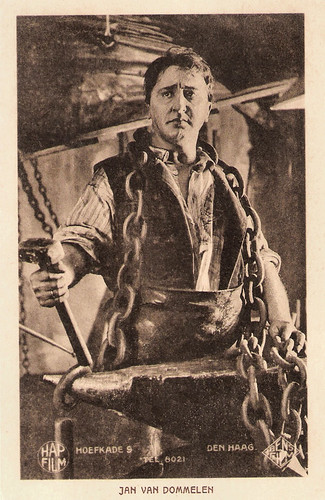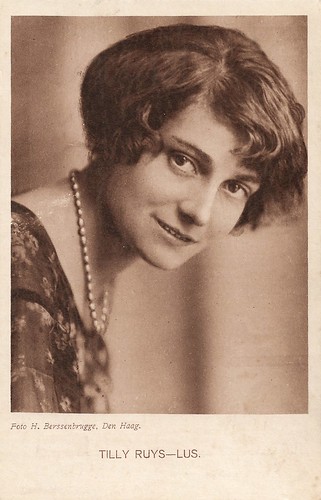Tilly Lus (1888-1971) was one of the great tragedy actresses of the Dutch theatre. She also appeared in five silent films.

Dutch postcard by Weenenk & Snel, Den Haag (The Hague). Photo: Willem Coret.
Tilly Lus was born as Mathilda Gerardina Barbier in Zaandam, The Netherlands, in 1888.
She was a member of the actors family Barbier and a daughter of actress and dancer Johanna Catharina Peternella Barbier (1848-1927), widow of stage manager/actor/prompter Wilhelmus Hermanus Lus (1834-1882).
As a child on stage, Tilly already performed on stage.
In 1907, she played the leading character Kleine Jan (Little John) in Herman Heijermans' neo-romantic fantasy play 'Uitkomst' (Outcome), which was booed by the audience at the premiere in de Hollandsche Schouwburg.
She also played for the stage company Die Haghe Players, directed by Eduard Verkade.

Eduard Verkade. Dutch postcard by Weenenk & Snel, Den Haag. Photo: Willem Coret. Collection: Geoffrey Donaldson Institute.
During the era of silent cinema, Tilly Lus played in five Dutch films, which are all missing now. IMDb and Wikipedia mention three films, including two productions for the Film-Fabriek Anton Nöggerath (Anton Nöggerath film factory).
De bannelingen / The Exiles (Leon Boedels, Caroline van Dommelen, 1911) was based on a novel by Oscar Wilde about a group of 19th century nihilists that wants to change the system in czaristic Russia. The second film was Don Juan (Leon Boedels, 1913) featuring Willem van der Veer. An advertisement conserved at the Eye Film Institute states that the latter film was an "enormous success".
Her third film is the first Dutch |Horror thriller Het Geheim van het Slot Arco / The Secret of Arco Castle (Maurits Binger, Jan van Dommelen, 1915). In this Hollandia Filmfabriek production, filmed in Austria, Lus co-starred opposite Jan van Dommelen.
Film in Nederland (Film in the NL), a former site by Eye - Film Institute Netherlands also mentioned: De paardrijdster / The Equestrienne (Maurits H. Binger, 1912), produced by Binger's company Maatschappij voor Artistieke Cinematografie, a precursor of his Filmfabriek Hollandia.
Her final film appearance was in a film insert for the play 't Speldenraapstertje' (The Little Needle Girl), a romantic comedy in three acts and an epilogue. The epilogue was the film insert, projected on a screen. Director Willy Mullens filmed this insert produced by his company Haghe Film for the stage company Het Princesse-Tooneel.

Jan van Dommelen. Dutch postcard by E & B. Photo by HAP Film / Bens Film, Den Haag. Publicity still for the film Schakels (Maurits Binger, 1920), based on a play by Herman Heijermans.
In the following decades, Tilly Lus became one of the most renowned performers on the Dutch stage. According to the Dutch Theaterencyclopedie: "She was a major tragedienne, and was characterised by great intensity and truthfulness".
In the 1930s, she worked for the theatre company Centraal Tooneel and played in this period regularly with another legendary Dutch stage actress, Mary Dresselhuys.
Her most famous roles include Hannele in Gerhart Hauptmann's Hannele's Hemelvaart (Hannele's Ascension), Tsjie Moe in 'De gele mantel' (The Yellow Jacket), Mademoiselle in Jacques Deval's play Mademoiselle (1932), Harriet in Ludwig Biro's 'Masks' and the title role in 'Renee Jeanne' by Nora Jonuxi.
Her final role was Maria in 'Een familie in Nazareth' (A Family in Nazareth) by Leonore Coffe and William Joyce Cowen at the Centraal Tooneel. In 1933 Lus was appointed Ridder in de Orde van Oranje-Nassau (Knight of the Order of Oranje-Nassau).
On 9 May 1940, she performed for the last time on stage. After the war, she did not want to play anymore. Since 1915, she was married to famous Dutch actor and director Cor Ruys. They had six children, including actress Louise Ruys. In 1971, Tilly Lus died in The Hague at the age of 83.

Dutch postcard by Photogravure, no. 903. Photo: Henri Berssenbrugge, The Hague. This sepia card is part of a large series of 1920s Dutch stage players and directors, photographed by Berssenbrugge and other acclaimed Dutch photographers such as J. Merkelbach. The series was called Photogravure and edited by J.W. Jansen's publishing company in Utrecht.
Sources: Film in the Netherlands (Dutch - Now defunct), Theaterencyclopedie (Dutch), DBNL (Dutch), Wikipedia (Dutch) and IMDb.
This post was last updated on 15 April 2025.

Dutch postcard by Weenenk & Snel, Den Haag (The Hague). Photo: Willem Coret.
Booed by the audience
Tilly Lus was born as Mathilda Gerardina Barbier in Zaandam, The Netherlands, in 1888.
She was a member of the actors family Barbier and a daughter of actress and dancer Johanna Catharina Peternella Barbier (1848-1927), widow of stage manager/actor/prompter Wilhelmus Hermanus Lus (1834-1882).
As a child on stage, Tilly already performed on stage.
In 1907, she played the leading character Kleine Jan (Little John) in Herman Heijermans' neo-romantic fantasy play 'Uitkomst' (Outcome), which was booed by the audience at the premiere in de Hollandsche Schouwburg.
She also played for the stage company Die Haghe Players, directed by Eduard Verkade.

Eduard Verkade. Dutch postcard by Weenenk & Snel, Den Haag. Photo: Willem Coret. Collection: Geoffrey Donaldson Institute.
Missing films
During the era of silent cinema, Tilly Lus played in five Dutch films, which are all missing now. IMDb and Wikipedia mention three films, including two productions for the Film-Fabriek Anton Nöggerath (Anton Nöggerath film factory).
De bannelingen / The Exiles (Leon Boedels, Caroline van Dommelen, 1911) was based on a novel by Oscar Wilde about a group of 19th century nihilists that wants to change the system in czaristic Russia. The second film was Don Juan (Leon Boedels, 1913) featuring Willem van der Veer. An advertisement conserved at the Eye Film Institute states that the latter film was an "enormous success".
Her third film is the first Dutch |Horror thriller Het Geheim van het Slot Arco / The Secret of Arco Castle (Maurits Binger, Jan van Dommelen, 1915). In this Hollandia Filmfabriek production, filmed in Austria, Lus co-starred opposite Jan van Dommelen.
Film in Nederland (Film in the NL), a former site by Eye - Film Institute Netherlands also mentioned: De paardrijdster / The Equestrienne (Maurits H. Binger, 1912), produced by Binger's company Maatschappij voor Artistieke Cinematografie, a precursor of his Filmfabriek Hollandia.
Her final film appearance was in a film insert for the play 't Speldenraapstertje' (The Little Needle Girl), a romantic comedy in three acts and an epilogue. The epilogue was the film insert, projected on a screen. Director Willy Mullens filmed this insert produced by his company Haghe Film for the stage company Het Princesse-Tooneel.

Jan van Dommelen. Dutch postcard by E & B. Photo by HAP Film / Bens Film, Den Haag. Publicity still for the film Schakels (Maurits Binger, 1920), based on a play by Herman Heijermans.
Great intensity and truthfulness
In the following decades, Tilly Lus became one of the most renowned performers on the Dutch stage. According to the Dutch Theaterencyclopedie: "She was a major tragedienne, and was characterised by great intensity and truthfulness".
In the 1930s, she worked for the theatre company Centraal Tooneel and played in this period regularly with another legendary Dutch stage actress, Mary Dresselhuys.
Her most famous roles include Hannele in Gerhart Hauptmann's Hannele's Hemelvaart (Hannele's Ascension), Tsjie Moe in 'De gele mantel' (The Yellow Jacket), Mademoiselle in Jacques Deval's play Mademoiselle (1932), Harriet in Ludwig Biro's 'Masks' and the title role in 'Renee Jeanne' by Nora Jonuxi.
Her final role was Maria in 'Een familie in Nazareth' (A Family in Nazareth) by Leonore Coffe and William Joyce Cowen at the Centraal Tooneel. In 1933 Lus was appointed Ridder in de Orde van Oranje-Nassau (Knight of the Order of Oranje-Nassau).
On 9 May 1940, she performed for the last time on stage. After the war, she did not want to play anymore. Since 1915, she was married to famous Dutch actor and director Cor Ruys. They had six children, including actress Louise Ruys. In 1971, Tilly Lus died in The Hague at the age of 83.

Dutch postcard by Photogravure, no. 903. Photo: Henri Berssenbrugge, The Hague. This sepia card is part of a large series of 1920s Dutch stage players and directors, photographed by Berssenbrugge and other acclaimed Dutch photographers such as J. Merkelbach. The series was called Photogravure and edited by J.W. Jansen's publishing company in Utrecht.
Sources: Film in the Netherlands (Dutch - Now defunct), Theaterencyclopedie (Dutch), DBNL (Dutch), Wikipedia (Dutch) and IMDb.
This post was last updated on 15 April 2025.
No comments:
Post a Comment